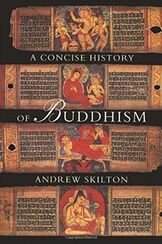
I've been making a concerted effort to read more history of India and China. I am not completely ignorant of these ancient culture's history but I am nowhere near as well versed as I am in the history of Europe, Africa or the Americas. I actually started reading A Concise History of Buddhism by Andrew Skilton, in 2022 but I include it here since I FINISHED it this year (early on this may be a theme)
I recently read a book called India, A History by John Keay, which is an excellent survey of the history from prehistoric time ALMOST to current events. After that I went searching for more specific topics which turned out to be more difficult than I anticipated.
Buddhism wasn't really on the radar but I stumbled across this book. What it turns out to be is a short but sometimes mind numbing survey of the various Buddhist trains of thought, schisms and theology. If you do not know ANYTHING about Buddhism this is going to be incredibly difficult to get through. The book is not big on explaining the basics, even basic terminology. It is pretty close to ALL theology so do not expect a great deal of political or personal history.
The book does detail many of the different lineages of Buddhism in an understandable way and there are other times when it gives you a glimpse into appeal of the religion. It also has a chapter on the reason Buddhism vanished in its homeland of India. It is not a particularly critical history but it does not shy away from the "warts" either. There is a concerted attempt to be even handed between the different sects (for lack of a better word).
I am glad that I read it and I would recommend this to people interested in theology. It is interesting in a comparative sense too. When you look at other religious traditions you see parallels. One thing that struck me is how the biggest world religions all seem to share a trait. Almost immediately after the demise (or ascension ) of the religion's founder there are suddenly myriad interpretations and sometimes outright perversions of the original intent. Buddhism does not escape this (if this book is to be believed).
Keep in mind, this book is written by a true believer and there is no delving into the hinted at hypocrisies and potentially ahistorical interpretations by Buddhist thinkers.
I recently read a book called India, A History by John Keay, which is an excellent survey of the history from prehistoric time ALMOST to current events. After that I went searching for more specific topics which turned out to be more difficult than I anticipated.
Buddhism wasn't really on the radar but I stumbled across this book. What it turns out to be is a short but sometimes mind numbing survey of the various Buddhist trains of thought, schisms and theology. If you do not know ANYTHING about Buddhism this is going to be incredibly difficult to get through. The book is not big on explaining the basics, even basic terminology. It is pretty close to ALL theology so do not expect a great deal of political or personal history.
The book does detail many of the different lineages of Buddhism in an understandable way and there are other times when it gives you a glimpse into appeal of the religion. It also has a chapter on the reason Buddhism vanished in its homeland of India. It is not a particularly critical history but it does not shy away from the "warts" either. There is a concerted attempt to be even handed between the different sects (for lack of a better word).
I am glad that I read it and I would recommend this to people interested in theology. It is interesting in a comparative sense too. When you look at other religious traditions you see parallels. One thing that struck me is how the biggest world religions all seem to share a trait. Almost immediately after the demise (or ascension ) of the religion's founder there are suddenly myriad interpretations and sometimes outright perversions of the original intent. Buddhism does not escape this (if this book is to be believed).
Keep in mind, this book is written by a true believer and there is no delving into the hinted at hypocrisies and potentially ahistorical interpretations by Buddhist thinkers.
 RSS Feed
RSS Feed